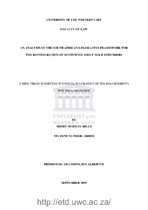| dc.contributor.advisor | Albertus, Chesne | |
| dc.contributor.author | Mills, Moses Norman | |
| dc.date.accessioned | 2020-08-12T10:51:33Z | |
| dc.date.available | 2020-08-12T10:51:33Z | |
| dc.date.issued | 2019 | |
| dc.identifier.uri | http://hdl.handle.net/11394/7305 | |
| dc.description | Magister Legum - LLM | en_US |
| dc.description.abstract | South Africa has one of the highest crime rates in the world. The state aims to reduce the
prevalence of crime mainly by sentencing offenders to imprisonment. In turn the goal of
imprisonment is to rehabilitate offenders so that they can refrain from reoffending and be
reintegrated into society. Unfortunately, due to various factors which exist inside and outside
of prisons, rehabilitation and reintegration is difficult to achieve. The study unpacks the
perennial question of whether or not the state has a legal duty to reintegrate offenders into
society. This question looms particularly, during the post-release phase of offenders’ life.
Preliminary indications are that the state currently views reintegration as a ‘societal
responsibility.’ This study intends to determine whether or not the state has a legal duty to
reintegrate offenders and provide them with support even after their release from
imprisonment. | en_US |
| dc.language.iso | en | en_US |
| dc.publisher | University of the Western Cape | en_US |
| dc.subject | Reintegration | en_US |
| dc.subject | Rehabilitation | en_US |
| dc.subject | Correctional Services Act | en_US |
| dc.subject | Overcrowding | en_US |
| dc.subject | Sentencing | en_US |
| dc.subject | Correctional facilities | en_US |
| dc.subject | Department of Correctional Services | en_US |
| dc.subject | Offenders | en_US |
| dc.subject | Recidivism | en_US |
| dc.subject | Criminal justice | en_US |
| dc.title | An analysis of the South African legislative framework for the reintegration of sentenced adult male offenders. | en_US |
| dc.rights.holder | University of the Western Cape | en_US |

